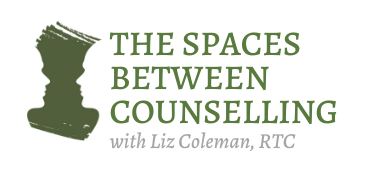The Spaces Between Counselling
The Power of Perception
The greatest area of growth my clients experience from our work together is the shift in perception that their problems are not what they thought they were. Struggle is a place of transition and can be your power spot.
You are on the “threshold” of creating and learning something new in your life.
Although this can be difficult, anxiety and struggle act as a motivator to create change. That is its job. You are at a place where all the possibilities and richness of life are yours to be found. What will you choose to do?
Surrey Counsellor, Liz Coleman MTC, RCS
“Different perspectives create different choices and different choices create different results!“
Liz Coleman
Surrey Counsellor, Liz Coleman MTC, RCS
“Different perspectives create different choices and different choices create different results!“
Liz Coleman
You are on the “threshold” of creating and learning something new in your life.
Although this can be difficult, anxiety and struggle act as a motivator to create change. That is its job. You are at a place where all the possibilities and richness of life are yours to be found. What will you choose to do?
Counselling Services
Your struggles can be the key to discovering the tools to turn your life around. Take this opportunity to get to the root and find clarity about what derails you and what gets you back on track to living your goals and life purpose.
As a Master Therapeutic Counsellor and Registered Counselling Supervisor (MTC, RCS) based in Surrey, BC, I'm dedicated to working with you to create positive changes in your life. Let's work together to make a real impact!
Couples Therapy & Relationship Counselling
Couples in distress can feel chaotic, affecting not only their own lives, but also those around them. Whether you are at the beginning of your relationship, in the middle, or questioning if this is the end, Couples Counselling can help.
Anger, Healthy Boundaries & Communication Counselling
Is your anger or silence pushing people away? Are you afraid of losing those closest to you? Good or bad, your ability to manage your anger and communicate effectively with others touches all areas of your life.
Stress & Anxiety Counselling
Are stress and anxiety running your life? Whether you’re feeling overwhelmed, frustrated, exhausted or stuck, know you are not alone! Also know that a different experience is possible. That is the goal of counselling — to identify and make even small changes that will create a positive difference.
Self-Esteem Counselling
Low self-esteem is the main reason people seek counselling. The National Institute of Mental Health (NIMH) has found 1 out of 4 adults suffer from a psychological disorder and low self-esteem is the underlying factor for the majority of them.

Clinical Supervision
Liz Coleman is an approved Registered Counselling Supervisor with The Association of Cooperative Counselling Therapists of Canada (ACCT).
Providing competency-based supervision for counsellors who:
– Require ongoing proof of supervision through their counselling association.
– Are new counsellors and would like support in setting up their practice.
– Want to take their practice to the next level.
– Seek ongoing growth and learning.
“Liz has an uncanny knack for getting straight to the heart of the matter, to carve out new ways of seeing things I never had before.”
“I used to think it was weak to do this (counselling) but now I see the benefits.
Negative energy used to stay with me constantly and I’d push people away by yelling and getting angry. Now I notice the feelings bubbling up and I take an extra minute before I talk or not. I have awareness of my feelings now and can see what’s most important to me.
I never realized my yelling and anger was a problem and now I see it’s not necessary. I still have moments that I revert back but it’s not as often.”
“Know that what you do in the time of your greatest trial can be your greatest triumph.”
Neale Donald Walsch
“Know that what you do in the time of your greatest trial can be your greatest triumph.”
Neale Donald Walsch
“I used to think it was weak to do this (counselling) but now I see the benefits.
Negative energy used to stay with me constantly and I’d push people away by yelling and getting angry. Now I notice the feelings bubbling up and I take an extra minute before I talk or not. I have awareness of my feelings now and can see what’s most important to me.
I never realized my yelling and anger was a problem and now I see it’s not necessary. I still have moments that I revert back but it’s not as often.”
“Liz has an uncanny knack for getting straight to the heart of the matter, to carve out new ways of seeing things I never had before.”
The Spaces Between
I named my business The Spaces Between as soon as I heard the phrase. It perfectly explained the experience I wanted to cultivate in my counselling practice.
Definition:
Firstly, it symbolizes the dynamic connection and potential between things and people where sparks, growth, shifts in perspective and thinking—essentially all the good stuff — happens! ![]()
Secondly, it represents mindfulness, those moments of calm amidst the constant chatter of our minds. These are the subtle gaps where we can reflect on who we are, who we aspire to be and the habits or mistaken beliefs that are getting in the way.
However, our obsession with external distractions like social media, busy-ness, or perfectionism overshadows these powerful moments. Consequently, when these vital thoughts and feelings are overlooked, they can manifest in disruptive ways – from panic or anxiety attacks to aggression or conflicts in relationships. As well as internally as depression, physical ailments, or overall dissatisfaction with life.
To access this innate wisdom, we must cultivate awareness and practice mindfulness. By pausing and listening closely to our inner dialogue, we can uncover valuable insights about ourselves.
And counselling helps by offering invaluable support and guidance to navigate and learn from the experiences that arise within “The Spaces Between.”
The Power of Perception
![]() An optical illusion was an obvious choice to me for my business logo once I’d picked the name. To me, this particular optical illusion represents new perceptions and growth in the space between the faces. Plus, it perfectly explains how counselling works.
An optical illusion was an obvious choice to me for my business logo once I’d picked the name. To me, this particular optical illusion represents new perceptions and growth in the space between the faces. Plus, it perfectly explains how counselling works.
With an optical illusion, you know there’s another picture or another way of seeing what your eyes are telling you is there. The four skills needed to see the other picture are trust, willingness, curiosity, and determination. It’s the same with counselling through a problem.
When we’re in pain, struggling, stuck or frustrated with a situation, choosing to talk to someone means you know there’s got to be a better way, but nothing you’ve tried has worked. We can’t see through these things alone because the struggle is a blind spot, something we haven’t learned yet (a new picture) so we can’t see it.
Four Key Skills
- Trust — that there is another way of seeing it.
- Willingness — to surrender the ‘truth’ of what your eyes are telling you, to see what is not yet visible.
- Curiosity — to stay open and available to anything. Opening your mind to any possibility.
- Determination — looking at the picture or issue for as long as it takes, determined to have a different experience and see something new.
It’s a relief to remember there’s always a bigger picture that you’re not seeing
Once you’ve seen the other picture in an optical illusion, you can’t un-see it. Like getting to know yourself, once you see the light at the end of the tunnel you never lose the knowledge of its existence. You may forget, but it comes back easily.
Unlike how we try to understand most things in life you can’t “figure out”, or “fix” an optical illusion. Only curiosity and openness will get you there which means you have to surrender or let go of what you think you know is true (what your eyes are telling you)
Like the hidden picture in an optical illusion, the truth or solution is in you. It doesn’t need to be “found,” created or arrived at. It’s already there. It just needs the space to be revealed.

Understanding Stress and Distress: The Role of Coping Skills to Heal Attachment Trauma
Stress is an inevitable part of life It’s the body’s natural response to challenges and demands, and in moderate amounts, it can be beneficial, enhancing our attention and memory, motivating us to achieve goals, and building resilience. However, when stress becomes...

Do Your Inner Thoughts Often Sound Judgemental and Critical?
If you find yourself in self-judgement and shame, such as thinking “I’m not good enough,” you’re not alone. It’s a Universal experience. Did you know that when you judge yourself, when you shame yourself, you shut down the Learning Center in your brain? The result is...

When Someone Asks “How are You” & You Say, “I’m Fine,” Are You Really?
This week is Mental Health Week in Canada. And how timely given the challenging times of this global pandemic. The overarching message for the year is the importance of social connection on mental health. A message that’s difficult to heed when we’re trying to protect...

Two Tools to Calm Anxiety
1. A Simple Meditation Count 30 breaths backwards. Meditation doesn’t have to be complicated. Focusing on your breathing is a mindful way to calm down. Counting backwards gives your mind a simple task to focus on, distracting you from spiraling thoughts. Meanwhile the...

Isolation and Mental Health
At this time staying home (in isolation) to help prevent the spread of the coronavirus is an act of safety, solidarity and kindness. But no longer having interactions with the people we did before and changes to work and routine can be especially hard to deal with....

What Is Complex PTSD?
In order to understand Complex PTSD, let’s first talk about PTSD or Post- Traumatic Stress Disorder, which you have probably heard of. Post-Traumatic Stress Disorder PTSD is a mental illness or disorder caused or triggered by some kind of shocking or terrifying event....

Intimacy: About More Than Sex
If you hear the word intimacy, most people have an instant association with sex—that if you’re talking about intimacy, then you’re talking about sex. But that’s not the case. Intimacy and sex and two different things. Intimacy is described by Mariana Bockarova, Ph.D.,...

The Authenticity Debate
“Authenticity” is an overused and often-debated term these days. We are told to be authentic at work to achieve sales and success, authentic on social media to acquire a big following and authentic everywhere else as well. So, the Question Arises, What Exactly is...

Real Connection in Communication – 5 Steps
Being real in your communication invites connection. That often requires some vulnerability and that’s not something we feel comfortable doing with just anyone. It is important to make connections through communication. In this post we will give you resources for how...

Choice Moments – Building Trust with a Simple Decision
Our Lives are Full of Meaningful Moments of Choice Moments that you get to decide which direction you want your life to move to. You can choose the easy way or a more challenging route. Those times when you can turn towards someone and create a better connection and...






